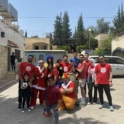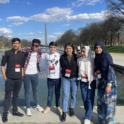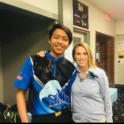West Bank YES alumni organized a GYSD event for orphaned children.
STORIES
Water School YES Grant Funded Project Serves Southwest Moroccan Community

Photo: Group picture at Algzeera beach (Southwest Morocco). We organized an excursion for the kids to discover the ocean.
By Marouane Smaili, YES 2007-2008, Morocco
The YES program was a pivotal experience for me, because it introduced me to the American way of life and changed me significantly. Through this journey, I developed a consciousness about myself as an active and potential agent for change if I so choose. My “coming of age” culminated in embracing positive, core values; and the one value that spoke most to me was helping people through community service.
When I returned to Morocco, my perspective of the world and my role in community service had changed. Since then, I have become a true convert, initiating and dedicating myself to community service endeavors.
My passion for community development grew in scale when I joined the NGO-world while still a graduate student. The adventure began by joining the Association Dar Si Hmad for Development, Education and Culture (Dar Si Hmad for short) as a communication officer and project coordinator. Dar Si Hmad’s mission is to improve community development in Southwest Morocco through innovative projects. For example, Dar Si Hmad runs an ongoing fog-collection development project in this semi-arid, mountainous and landlocked region. Working at Dar Si Hmad has inspired me to translate my passion for improving my society into tangible terms. Knowing that the YES program supports YES alumni through funding community service projects, I submitted a grant proposal for the 2014 YES alumni grants competition.
This summer, our team at Dar Si Hmad, in partnership with the provincial delegation of the Ministry of Education, implemented a summer camp for 46 rural children in Agni N’Zekri Village in the Sidi Ifni region in the southwest of the country close to Agadir. These children seldom experience what we as urban dwellers take for granted. In the spirit of sharing and empowering, we devised a project focusing precisely on what is needed in the rural world. To give a background, there are three rudimentary rural primary schools servicing a total of 11 villages, each school serviced with one teacher and possessing only one classroom. Unfortunately this can lead to poor educational standards, ranging from inadequate facilities to lack of water. The language of instruction is in Arabic in a predominantly Berber community. All these conditions can make of these students passive listeners instead of active participants in their own learning.
“The Water school,” a playful title for our project, but one with a deep impact on the community’s future generation, is unique in the region. “The Water School” is the first of its kind to teach children about water, a scarce resource where they live, through fun and hands-on activities with a broader purpose of raising awareness and stimulating curiosity around the notion of water and environment. The activities were a combination of educational games, field trips, Information and Communication Technology (ICT) and scientific workshops based on an experiential approach.
Seeing the children enjoy this unconventional summer camp was a success in itself. I couldn’t help but feel a sense of pride as I noticed the shy 6 year-old boy who barely spoke the first day and who could, by the closing of the program, summarize the workshop's content; or this other girl, always absent-minded, who now sits in the front row, eager to respond to all questions.
These personal transformations were proof that our project not only improved the children’s knowledge around water, but deeply impacted their personalities. I believe we have future leaders within these communities in the decades to come.
As the project drew to an end, I kept wondering the extent to which untapped potential and talent exist in our communities but of which we are so rarely conscious. This prompted me to consider what the role of responsible citizens, as I see myself, must be to participate in creating positive change in our environment and become engaged agents instead of passive spectators bemoaning difficult situations.





